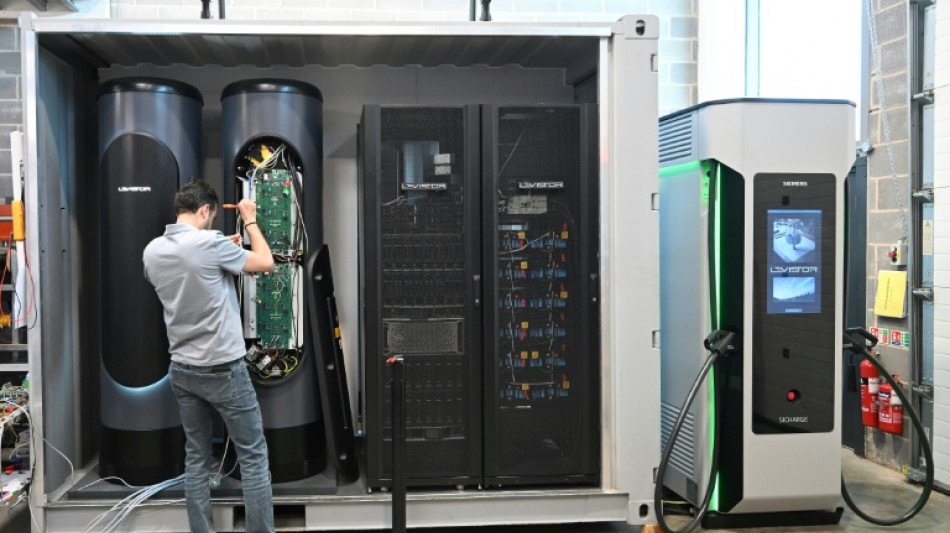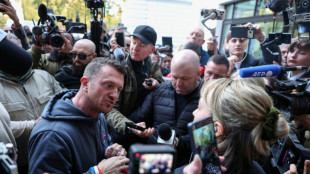
-
 Liverpool down Real Madrid in Champions League, Bayern edge PSG
Liverpool down Real Madrid in Champions League, Bayern edge PSG
-
Van Dijk tells Liverpool to keep calm and follow Arsenal's lead

-
 PSG left to sweat on injuries to Dembele and Hakimi
PSG left to sweat on injuries to Dembele and Hakimi
-
Reddit, Kick to be included in Australia's social media ban

-
 Ex-Zimbabwe cricket captain Williams treated for 'drug addiction'
Ex-Zimbabwe cricket captain Williams treated for 'drug addiction'
-
Padres ace Darvish to miss 2026 MLB season after surgery

-
 Diaz hero and villain as Bayern beat PSG in Champions League showdown
Diaz hero and villain as Bayern beat PSG in Champions League showdown
-
Liverpool master Real Madrid on Alexander-Arnold's return

-
 Van de Ven back in favour as stunning strike fuels Spurs rout
Van de Ven back in favour as stunning strike fuels Spurs rout
-
Juve held by Sporting Lisbon in stalling Champions League campaign

-
 New lawsuit alleges Spotify allows streaming fraud
New lawsuit alleges Spotify allows streaming fraud
-
Stocks mostly drop as tech rally fades

-
 LIV Golf switching to 72-hole format in 2026: official
LIV Golf switching to 72-hole format in 2026: official
-
'At home' Djokovic makes winning return in Athens

-
 Manchester City have become 'more beatable', says Dortmund's Gross
Manchester City have become 'more beatable', says Dortmund's Gross
-
Merino brace sends Arsenal past Slavia in Champions League

-
 Djokovic makes winning return in Athens
Djokovic makes winning return in Athens
-
Napoli and Eintracht Frankfurt in Champions League stalemate

-
 Arsenal's Dowman becomes youngest-ever Champions League player
Arsenal's Dowman becomes youngest-ever Champions League player
-
Cheney shaped US like no other VP. Until he didn't.

-
 Pakistan edge South Africa in tense ODI finish in Faisalabad
Pakistan edge South Africa in tense ODI finish in Faisalabad
-
Brazil's Lula urges less talk, more action at COP30 climate meet

-
 Barca's Lewandowski says his season starting now after injury struggles
Barca's Lewandowski says his season starting now after injury struggles
-
Burn urges Newcastle to show their ugly side in Bilbao clash

-
 French pair released after 3-year Iran jail ordeal
French pair released after 3-year Iran jail ordeal
-
EU scrambles to seal climate targets before COP30

-
 Getty Images largely loses lawsuit against UK AI firm
Getty Images largely loses lawsuit against UK AI firm
-
Cement maker Lafarge on trial in France over jihadist funding

-
 Sculpture of Trump strapped to a cross displayed in Switzerland
Sculpture of Trump strapped to a cross displayed in Switzerland
-
Pakistan's Rauf and Indian skipper Yadav punished over Asia Cup behaviour

-
 Libbok welcomes 'healthy' Springboks fly-half competition
Libbok welcomes 'healthy' Springboks fly-half competition
-
Reeling from earthquakes, Afghans fear coming winter

-
 Ronaldo reveals emotional retirement will come 'soon'
Ronaldo reveals emotional retirement will come 'soon'
-
Munich's surfers stunned after famed river wave vanishes

-
 Iran commemorates storming of US embassy with missile replicas, fake coffins
Iran commemorates storming of US embassy with missile replicas, fake coffins
-
Gauff sweeps Paolini aside to revitalise WTA Finals defence

-
 Shein vows to cooperate with France in probe over childlike sex dolls
Shein vows to cooperate with France in probe over childlike sex dolls
-
Young leftist Mamdani on track to win NY vote, shaking up US politics

-
 US government shutdown ties record for longest in history
US government shutdown ties record for longest in history
-
King Tut's collection displayed for first time at Egypt's grand museum

-
 Typhoon flooding kills over 40, strands thousands in central Philippines
Typhoon flooding kills over 40, strands thousands in central Philippines
-
Trent mural defaced ahead of Liverpool return

-
 Sabalenka to face Kyrgios in 'Battle of Sexes' on December 28
Sabalenka to face Kyrgios in 'Battle of Sexes' on December 28
-
Experts call for global panel to tackle 'inequality crisis'

-
 Backed by Brussels, Zelensky urges Orban to drop veto on EU bid
Backed by Brussels, Zelensky urges Orban to drop veto on EU bid
-
After ECHR ruling, Turkey opposition urges pro-Kurd leader's release

-
 Stocks drop as tech rally fades
Stocks drop as tech rally fades
-
UK far-right activist Robinson cleared of terror offence over phone access

-
 World on track to dangerous warming as emissions hit record high: UN
World on track to dangerous warming as emissions hit record high: UN
-
Nvidia, Deutsche Telekom unveil 1-bn-euro AI industrial hub


Britain's energy grid bets on flywheels to keep the lights on
Britain's energy operator is betting on an age-old technology to future-proof its grid, as the power plants that traditionally helped stabilise it are closed and replaced by renewable energy systems.
Spinning metal devices known as flywheels have for centuries been used to provide inertia -- resistance to sudden changes in motion -- to various machines, from a potter's wheel to the steam engine.
Grid operators are now looking to the technology to add inertia to renewable-heavy electricity systems to prevent blackouts like the one that hit Spain and Portugal this year.
In an electricity grid, inertia is generally provided by large spinning generators found in coal-fired and gas power plants, helping maintain a steady frequency by smoothing fluctuations in supply and demand.
But renewable energy sources like solar and wind power don't add inertia to the grid, and usually cannot help with other issues, such as voltage control.
Flywheels can mimic the rotational inertia of power plant generators, spinning quicker or slower to respond to fluctuations.
Without rotating turbines, "the system is more prone to fluctuations than it would be otherwise", explained David Brayshaw, a professor of climate science at the University of Reading in England.
"As we get to ever higher levels of renewables, we're going to have to think about this more carefully," Brayshaw told AFP.
- Flywheels and batteries -
The Iberian Peninsula, which is powered by a high share of renewables, went dark on April 28 after its grid was unable to absorb a sudden surge in voltage and deviations in frequency.
Spain's government has since pointed fingers at conventional power plants for failing to control voltage levels.
It could serve as a wake-up call similar to a 2019 outage which plunged parts of Britain into darkness following a drop in grid frequency.
That blackout prompted UK energy operator NESO to launch what it called a "world-first" program to contract grid-stabilising projects.
Flywheels and batteries can add synthetic inertia to the grid, but engineering professor Keith Pullen says steel flywheels can be more cost-effective and durable than lithium-ion batteries.
"I'm not saying that flywheels are the only technology, but they could be a very, very important one," said Pullen, a professor at City St George's, University of London and director of flywheel startup Levistor.
In the coming years, Pullen warned the grid will also become more unstable due to greater, but spikier demand.
With electric cars, heat pumps and energy-guzzling data centres being hooked onto the grid, "we will have more shock loads... which the flywheel smooths out".
- Carbon-free inertia -
Norwegian company Statkraft's "Greener Grid Park" in Liverpool was one of the projects contracted by NESO to keep the lights on.
Operational since 2023, it is a stone's throw from a former coal-fired power station site which loomed over the northern English city for most of the 20th century.
But now, instead of steam turbines, two giant flywheels weighing 40 tons (40,000 kilograms) each whirr at the Statkraft site, which supplies one percent of the inertia for the grid needed in England, Scotland and Wales.
Each flywheel is attached to a synchronous compensator, a spinning machine that further boosts inertia and provides voltage control services in the Liverpool region.
"We are providing that inertia without burning any fossil fuels, without creating any carbon emissions," said Guy Nicholson, Statkraft's zero-carbon grid solutions head.
According to NESO, 11 other similar synchronous compensator and flywheel projects were operational in Britain as of 2023, with several more contracted.
- 'Not fast enough' -
The government is "working closely with our industry partners who are developing world-leading technology, including flywheels, static and synchronous compensators, as we overhaul the energy system", a Department for Energy Security and Net Zero spokesperson told AFP.
But, "we aren't building them fast enough to decarbonise the grid", warned Nicholson.
Britain aims to power the grid with clean energy 95 percent of the time by 2030, before completely switching to renewables in the next decade.
"At the moment... we can't even do it for one hour," said Nicholson.
Even when there is sufficient solar and wind energy being generated, "we still have to run gas turbines to keep the grid stable", he explained.
Still, Britain and neighbouring Ireland seem to be ahead of the curve in procuring technology to stabilise renewable-heavy grids.
"In GB and Ireland, the system operators are leading by contracting these services," Nicholson said. "On the continent, there hasn't been the same drive for that."
"I think these things are driven by events. So, the Spanish blackout will drive change."
C.AbuSway--SF-PST
